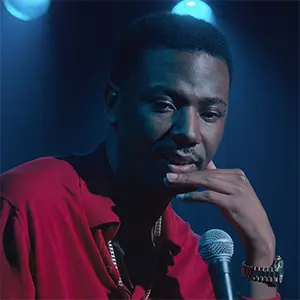Jerrod Carmichael transcends the boundaries of standup comedy with HBO's Rothaniel
-

"Some standup comics pause for laughs," says Eric Kohn of Carmichael's third HBO special, directed by Bo Burnham. "Jerrod Carmichael stops to think. That impulse has never been more profound than in his latest special, Rothaniel, when he comes out of the closet and lets the news sink in. At first, the audience isn’t sure how to react; a few seconds later, the applause streams in, and the show evolves. But that definitive moment represents a turning point for the special as well: It invites the audience into the show, as it transcends the boundaries of the form to become a brilliant documentary of the comic’s life-changing confession. Multiple times throughout the second half of Rothaniel, as Carmichael gets deep and personal about the challenges his sexuality have caused for his closest relatives, the audience chimes in, and Carmichael plays along. The results add a revelatory component to the special that plays like a portrait of Carmichael’s anguish, and the attitude that carries him through it." Kohn adds: "For Burnham, Rothaniel follows his masterful 2021 Inside (an actual 90-minute movie in disguise), another sneaky use of the comedy special that mutates into a more advanced concept with time. While the home setting of Inside uses pandemic-era claustrophobia as a jumping-off point for crafting a solipsistic musical, Rothaniel treats the comedy club like a psychological labyrinth filled with personal reckonings: Carmichael bobs and weaves through personal history with an imaginative form of exhibitionism that has more in common with the climax of All That Jazz than any conventional standup routine. The stage isn’t a veil — it’s a magnifying glass."
ALSO:
- Jerrod Carmichael's Rothaniel complicates the neatness that pop-culture tends to treat the coming-out process: "Like most stand-ups at his level, Carmichael, a talented veteran, knows how to command the audience by taking up space," says Inkoo Kang. "But here, he’s often seen in close-up retreating into himself: crumpling his body, cradling his head in the crook of his arm, directing his gaze downward or away from the audience. He’s unlearning his craft to explore what else it could be. Carmichael might well be the most prominent comic to come out onstage. But what makes Rothaniel .... so poignant are his descriptions of his ongoing reconciliation with his sexuality, as well as his parents’. We generally think of coming out as a temporal marker: There’s the era before and the era after. Carmichael complicates the neatness with which pop culture tends to treat this process. He struggles with the internalized homophobia that renders his sexuality still 'shocking' to himself. Many of his friends feel like he’s been lying to them for years. He has to periodically remind his father that he’s gay, because 'he forgets.'"
- Carmichael delivers one of the most emotional standup performances you'll ever see: "The second half of Rothaniel is a therapy session," says Garrett Martin. "It’s one man working through his most personal problems on stage in front of a supportive audience—and on HBO Max in front of whatever Saturday Night Live fans decide to stream the new special by that show’s latest host. It’s an intimate, almost uncomfortable conversation about how Carmichael’s mother has essentially broken his heart with her reaction (or lack thereof) to his revelation. Carmichael bares his soul as his audience asks him questions about his mother and tries to talk him towards some kind of hope, only for the comic to grow more visibly dejected the more they discuss it. He even admits he’d prefer for her to be angry about it, because at least that would be a legitimate response, rather than completely refusing to engage with the situation. Despite Carmichael trying to talk his way to a positive outlook, despite his fans trying to encourage him, and despite ending on a great laugh that he sets up with the very first line of the special, Rothaniel is ultimately one of the saddest comedy specials you’ll ever see—and one of the most emotional and masterful performances by a comedian ever committed to tape."
- Carmichael coming out breaks a cycle of Black queer shame: "While all queer people throughout modern times have fought for the freedom to live publicly and equally, Black celebrities have typically stayed in the closet for much longer, even after other white stars came out en masse," says Joseph Lamour. "Years of speculation around Queen Latifah’s sexuality dogged her in tabloids. And although Latifah has since come out, other Black celebrities never got the chance." Lamour adds: "Today, there are many queer Black comedians living their truths out and proud. Wanda Sykes just co-hosted the Oscars, bringing her wife to the red carpet on Hollywood’s biggest night. Carmichael also joins the ranks of Solomon Georgio, Jaboukie Young-White, Sam Jay, Dwayne Perkins, Sampson McCormick, and Punkie Johnson, who became the first openly queer Black cast member of SNL, proving every week that our comedy chops should never be questioned. Further, Carmichael starred in a skit with gay cast member Bowen Yang on Saturday, depicting what may be the first time an interracial gay couple of color has been in an SNL skit playing an interracial gay couple of color. It’s certainly the first time I’ve seen it."
TOPICS: Jerrod Carmichael, HBO, Jerrod Carmichael: Rothaniel, Bo Burnham, LGBTQ, Standup Comedy
More Jerrod Carmichael on Primetimer:
